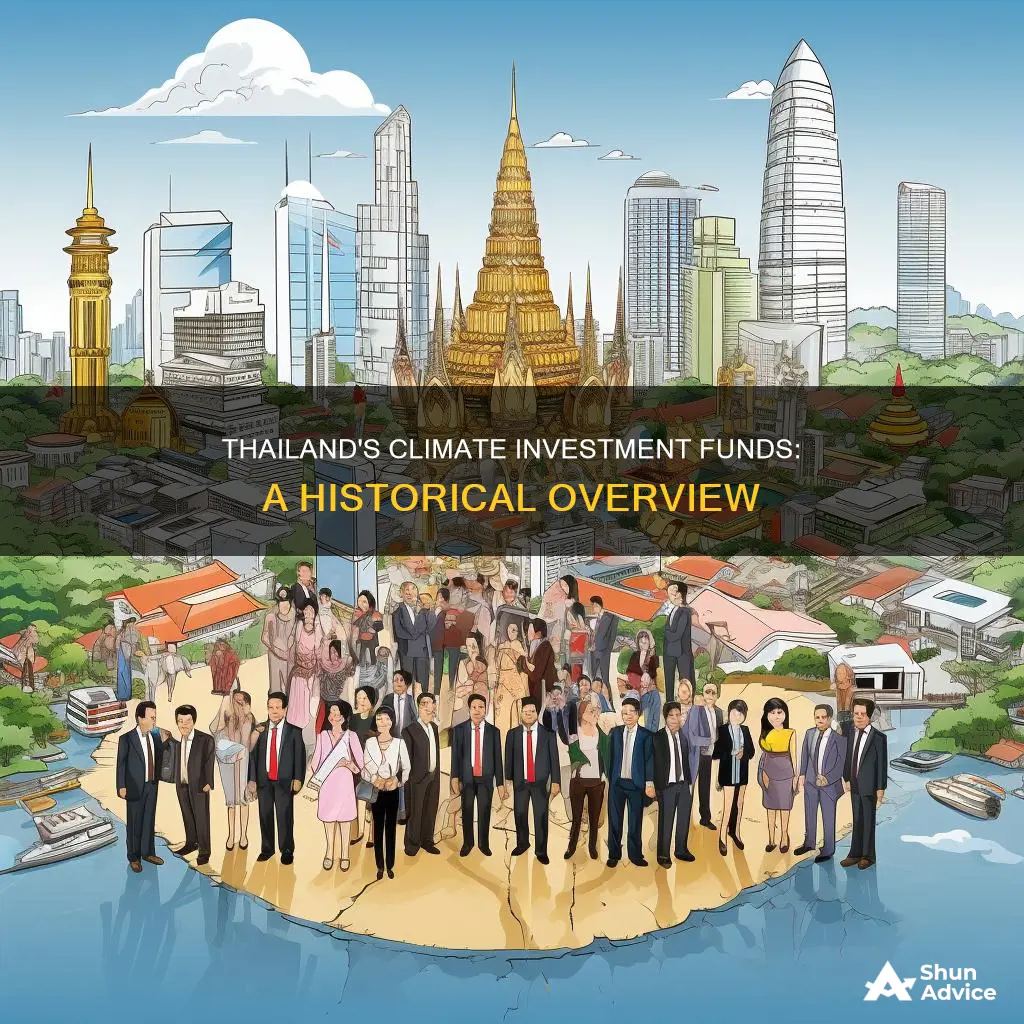
Thailand is an upper-middle-income country with a pro-investment stance and well-developed infrastructure. Despite some political uncertainty, it continues to encourage foreign direct investment to promote economic development, employment, and technology transfer. In recent decades, Thailand has been a major destination for foreign direct investment, with hundreds of US companies investing successfully in the country.
The Thai government has been taking steps to attract foreign investment in clean energy, electric vehicles, and related industries. In 2023, the Thai Climate Initiative (ThaiCI) was introduced as a funding window within the Environmental Fund, providing subsidies to local stakeholders for effective climate action implementation. The ThaiCI is one of the outputs of the Thai-German Cooperation on Energy, Mobility, and Climate (TGC-EMC) Project, commissioned by the International Climate Initiative (IKI) in December 2022.
Thailand is also developing a new National Energy Plan that will increase the target for renewable energy to 50% by 2037. This aligns with the country's commitment to sustainability, including the Bio-Circular Green Economy model. The Clean Technology Fund (CTF) is another example of Thailand's climate investment funds, with an $86 million investment plan to catalyze private-sector investments in renewable energy and energy efficiency.
| Characteristics | Values |
|---|---|
| Date of Start | August 2023 |
| Name of Initiative | Thai Climate Initiative (ThaiCI) Fund |
| Goal | To establish itself as a funding window within the Environmental Fund, providing subsidies to local stakeholders for effective climate action implementation |
| Target | Small-scale stakeholders including government agencies, local administration authorities, academic institutes, NGOs, and the private sector |
| Owner | Environmental Fund, led by the Office of Natural Resources and Environmental Policy and Planning (ONEP) |
| Cooperator | Deutsche Gesellschaft für Internationale Zusammenarbeit (GIZ) |
| Announcement of First Thai CI Call for Proposals | End of 2023 |
| Period | Four-year period (2023 – 2026) |
| Number of Calls for Proposals | At least four |
What You'll Learn

Thailand's vulnerability to climate change
Thailand is vulnerable to climate change due to its location in the Monsoon region of Southeast Asia, its long coastline, its fragile agricultural system, and its susceptibility to extreme weather events. The country has seen a marked increase in temperatures and changes in rainfall patterns over the past thirty years, which have significantly impacted food production, particularly rice—a staple for national food security.
The agriculture sector is particularly at risk, with 47%-55% of Thailand's land under agricultural use. Changes in climatic conditions, especially reduced rainfall, can destabilize agricultural productivity and impact farmers' incomes and lives. Climate change could result in the loss of up to 30% of the rural GDP of the lower Mekong region.
Thailand's long coastline makes it susceptible to coastal flooding, especially with the projected sea-level rise. The country is also vulnerable to riverine and flash floods, tropical cyclones, and droughts. These extreme weather events are expected to increase in frequency and intensity due to climate change, leading to irregular riverbank overflow, flash floods in urban areas, landslides, and flooding in coastal areas.
Additionally, Thailand shares international borders with Myanmar, Laos, Cambodia, and Malaysia, and its southern region borders the Andaman Sea, while its eastern region borders the Gulf of Thailand. These borders bring challenges and complexities to the management of climate change impacts and the coordination of responses across multiple nations.
To address these vulnerabilities, Thailand has implemented a demand-side management program and an energy conservation program. The Global Environment Facility has provided funding for Thailand to launch national climate change strategies. The Thai Climate Initiative (ThaiCI), introduced in August 2023, aims to establish itself as a funding window within the Environmental Fund, providing subsidies for local stakeholders to implement effective climate action.
Money Market Funds: Investment Options and Strategies
You may want to see also

The Thai Climate Initiative (ThaiCI) Fund
The ThaiCI aims to establish itself as a funding window within the Environmental Fund, providing subsidies to local stakeholders for effective climate action implementation. It also seeks to strengthen the Environmental Fund's capacities to become Thailand's first domestic climate finance mechanism. The ThaiCI supports both mitigation and adaptation projects, targeting small-scale stakeholders, including government agencies, local administration authorities, academic institutes, NGOs, and the private sector.
The first Thai CI call for proposals is tentatively planned for the end of 2023, with at least four calls for proposals expected over a four-year period (2023-2026).
Vanguard Funds: Best Investment Options for Your Portfolio
You may want to see also

Thailand's investment in clean technology
Thailand is vulnerable to a variety of natural disasters, including riverine, flash, and coastal flooding, tropical cyclones, and droughts. The country is particularly susceptible to floods, which are likely to increase with climate change due to rising sea levels and more frequent intense rainfall events. As a result, Thailand has been actively investing in clean technology and sustainable development to mitigate the impacts of climate change and promote environmental preservation.
One of the key investments in clean technology in Thailand is through the Climate Investment Funds' (CIF) Clean Technology Fund (CTF). Thailand's $86 million CTF investment plan aims to catalyze private-sector investments in renewable energy and energy efficiency. This includes supporting direct investments in state-owned electric utilities and Bangkok's bus rapid transit system. The plan seeks to address the institutional, technical, market, risk perception, and financial barriers hindering clean technology investments. To achieve this, the CTF is helping establish replicable business models and providing technical assistance to financial institutions to expand lending to both public and private developers.
In addition to the CTF, Thailand has also introduced the Thai Climate Initiative (ThaiCI) Fund, a new climate finance mechanism developed to advance climate action implementation in the country. The ThaiCI, introduced in August 2023, aims to establish itself as a funding window within the Environmental Fund, providing subsidies to local stakeholders for effective climate action implementation. It supports both mitigation and adaptation projects and targets small-scale stakeholders, including government agencies, local administration authorities, academic institutes, NGOs, and the private sector.
Thailand's Board of Investment (BOI) is also actively promoting and supporting investment in the green technology sector. The BOI offers a range of incentives and benefits to businesses, including tax breaks, investment promotion privileges, import duty exemptions, and land ownership rights. These incentives encourage the development and utilization of environmentally friendly solutions and have attracted both local and international investors.
The focus areas for Thailand's investment in clean technology and green tech include renewable energy sources such as solar, wind, and hydropower, smart cities with efficient waste management systems and intelligent transportation systems, sustainable agriculture with precision farming and hydroponics, and waste management with recycling, waste-to-energy conversion, and decentralized waste treatment technologies.
Thailand expects to attract about 2 trillion baht ($57 billion) in investments in green and tech sectors by 2030, including electric vehicles, smart electronics, and technologies to build a sustainable economy. These investments are projected to generate 625,000 new jobs and significantly contribute to the nation's gross domestic product.
Vanguard Funds: Best UK Investment Options
You may want to see also

The role of the Clean Technology Fund (CTF)
Thailand, located in Southeast Asia, is vulnerable to various natural disasters, including riverine, flash, and coastal flooding, tropical cyclones, and droughts. The Climate Investment Funds (CIF) has recognised the need for investment in Thailand to mitigate the effects of climate change.
The Clean Technology Fund (CTF) is a crucial component of CIF's investment strategy in Thailand. With an $86 million investment plan, the CTF plays a pivotal role in catalysing private-sector investments in renewable energy and energy efficiency. This involves supporting direct investments in state-owned electric utilities and Bangkok's bus rapid transit system. The CTF aims to address the institutional, technical, market, risk perception, and financial barriers that hinder clean technology investments.
One of the key roles of the CTF is to help establish replicable business models that promote clean technology. By providing technical assistance to financial institutions, the CTF enables them to expand lending to both public and private developers, thus increasing access to funding for clean energy projects. This assistance helps to establish a more sustainable and resilient energy landscape in Thailand.
Furthermore, the CTF contributes to the scaling up of smart energy and efficiency solutions. Through the CIF-TAF, over $500,000 was programmed for technical assistance activities in 2020 and 2021. These activities covered a range of topics, including the mitigation and adaptation measures necessary to support a green and resilient Covid-19 recovery in the region.
The CTF also supports the piloting and scale-up of low-carbon technologies through low-cost finance. This includes finance for renewable energy, energy efficiency, sustainable transport, and green industry projects. By doing so, the CTF helps to accelerate innovation and open new markets, boost investor confidence, and unlock additional sources of finance for a more sustainable future.
Hedge Fund Investment Strategies: Where and How They Invest
You may want to see also

Thailand's National Energy Plan
Thailand is highly vulnerable to the impacts of climate change, with floods, droughts, and rising sea levels becoming more common in the region. The country is taking steps to mitigate climate change and advance its journey towards net zero, with a focus on renewable energy and energy efficiency.
The Thai government has committed to carbon neutrality by 2050 and net-zero greenhouse gas emissions by 2065, announced at the COP26 Climate Change Conference. To achieve these goals, Thailand is working on increasing its renewable energy capacity and reducing its dependence on fossil fuels. The country's renewable energy sources include solar, wind, small and large hydropower projects, biomass, biogas, and waste-to-energy.
The Royal Thai Government is preparing the Thailand National Energy Plan (NEP), which will guide the country's energy system through the 2040s. The NEP will provide policy direction for both government agencies and private companies in the energy sector. The NEP 2023, currently awaiting approval, aims to increase renewable energy usage to over 50%, in line with the country's carbon and net-zero goals.
The NEP will combine and synchronize five action plans: the Gas Plan, Power Development Plan (PDP), Alternative Energy Development Plan (AEDP), Oil Plan, and Energy Efficiency Plan (EEP). The plan also promotes more efficient energy use, with a goal to cut energy consumption by 30% in 2030 and 40% in 2050. Thailand is also encouraging the use of electric vehicles (EVs), with a target of 50% of locally made vehicles being EVs by 2030.
In addition to the NEP, Thailand has introduced the Thai Climate Initiative (ThaiCI), a new climate finance mechanism developed to advance climate action implementation in the country. ThaiCI aims to provide funding for local stakeholders to implement effective climate action and strengthen the country's capacity for climate finance.
Thailand is also carrying out pilot projects for the development of an advanced grid system to manage the volatility associated with renewable energy. The government is actively pursuing new policy initiatives to enable households to generate, store, and sell electricity back to the grid, as well as exploring technologies such as carbon capture, hydrogen, sustainable aviation fuels, and grid modernization.
Vanguard Traditional IRA: Best Funds for Your Retirement Savings
You may want to see also
Frequently asked questions
The Thai Climate Initiative (ThaiCI) is a new climate finance mechanism developed to advance climate action implementation in Thailand. It was introduced in August 2023 and is one of the four outputs of the Thai-German Cooperation on Energy, Mobility, and Climate (TGC-EMC) Project, commissioned by the International Climate Initiative (IKI) in December 2022.
The ThaiCI aims to establish itself as a funding window within the Environmental Fund, providing subsidies to local stakeholders for effective climate action implementation. It also seeks to strengthen the Environmental Fund's capacities to become Thailand's first domestic climate finance mechanism.
The Clean Technology Fund is Thailand's $86 million investment plan to catalyze private-sector investments in renewable energy and energy efficiency. It also supports direct investments in these areas through state-owned electric utilities and Bangkok's bus rapid transit system.
CIF-TAF is a program that provided over $500,000 for technical assistance activities in 2020 and 2021. It covered topics such as scaling up smart energy and efficiency solutions and supporting green and resilient COVID-19 recovery in the region.
The Eastern Economic Corridor is an investment zone spanning Thailand's three eastern seaboard provinces: Chachoengsao, Chonburi, and Rayong. It offers tax breaks, regulatory concessions, and infrastructure to promote the development of high-tech and advanced industries.







